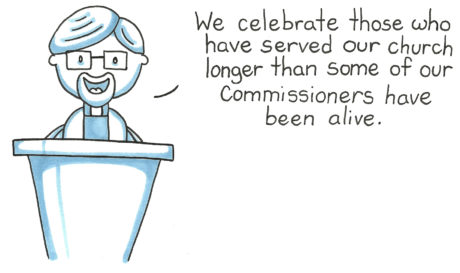It was an itchy assembly. Lots of scratching; little relief.
One commissioner said it was “sound and fury, signifying nothing.” Another called it “confusing.” Several wondered if anything had “actually happened.” The most common word used, in a casual poll done over meals and the long walks from the residence to the assembly hall, was “proxy.”
Proxy—overtures, motions, amendments, amendments to amendments, challenges to the moderator’s decisions, close votes and standing counts, all about something other than the actual thing being debated.
For example, a motion to defer a decision on an overture about what to do if a congregation wants to leave the denomination, which in itself was asking for a decision before other decisions had been made, was decided by a standing vote; that is, votes had to be manually counted because it was too close to call when commissioners raised their voting cards.
Edge-of-the-seat drama to determine exactly at what snail-speed the church must seek an answer. An answer to whether ordination and marriage for LGBT persons is doctrinally
acceptable within the Presbyterian Church in Canada.
There were a few direct attempts at The Issue, which fizzled, but not without tense standoffs. Many debates were related in some way, directly or indirectly, dependent on one’s point of view. They were signs of cracks in the denomination along one issue.
In another example, a recommendation—“That all courts of the church be urged to deal with people in same-sex relationships with tender pastoral care”—went through multiple sederunts and a standing vote and ended up as: “That all courts of the church be required to deal with all people with tender pastoral care.” A lot of sound and fury, but not necessarily about nothing. It was about something.
Step away from the issue of human sexuality and there was good news, mostly—new churches built and planted, lots of great missions, lots and lots of hardworking servants in the vineyard, dynamic partnerships with churches and organizations around the world. Sliding membership demographics, of course, with tough budgetary decisions, including the Record’s own report, and the solvency shortfall in the pension plan, which were dealt with efficiently and with graciousness. Signs of a Christ-centred church meeting the challenges of the age faithfully, maybe even with confidence.
There are hundreds of photographs from the 142nd General Assembly, held at York University, Toronto, online right here. There are live blog updates from each sederunt. Highlights are presented in the pages of this issue.
For now, however, as a means of reporting on the events within the PCC in early June, here are a couple of prayers as a sign of what we do best in our denomination. —Andrew Faiz
Moderator’s Prayer, June 6:
Father, we bring ourselves, our assembly,
our congregations, our denomination, to you.
We confess, Father, that we tend to wander;
we lose our focus; so much gets in the way.
And so, Father, perhaps we might better pray:
bring ourselves, our assembly, our congregations,
our denomination, back to you.
When how we do church gets in the way of what we need to see,
to understand, to do, bring us back to you.
When we get caught up with the trivialities and business
and upsets and slights of our own experience of church,
bring us back to you.
When the meetings and the budgets and the disputes
and complaints discourage us,
bring us back to you.
When the issues and the pressures and
the frustrations and demands overwhelm us,
bring us back to you.
When we lose focus, when it all stops making sense,
bring us back to you.
Bring us back to the foundation, the cornerstone,
the bedrock of our faith.
The Rock we call Jesus, and what he did for us,
for all the hurting world, the world which you so love.
May we always, ever, and primarily proclaim
the astonishing, timeless, undeniable truth
that Jesus Christ, your Son, died for all humanity,
paying the price for our sins,
bringing us forgiveness and peace,
peace with one another and with you.
That’s the story, Father. That’s what matters.
That’s the Rock upon which Jesus builds his church.
And so, Father, we bring ourselves-—
no, Father—we give ourselves, our assembly,
our congregations, our denomination, back to you.
Use us for your good will we pray. Amen.
—Rev. Douglas Rollwage
Mysteries of God, Morning Worship, June 6:
As we prepare to leave this place,
how can we be good stewards of the mysteries of
God in our faith and in our churches?
There are many ways,
and I think we could come up with many more.
But here are a few ways to get us started thinking:
Remind each other, often,
that God is God and we are not.
God has been called the mysterium tremendem—
the overwhelming mystery.
Even when this seems a little frightening,
it is our faith that allows us to trust in the goodness
and love of this overwhelming mystery.
Recognize that God is often at that place
where words stop and cannot go any further.
Honour that place. Seek it out.
Invite wonder.
Become comfortable with ambiguity.
Let some things be and stay
unexplainable and unknowable
and beyond experience in a way that evokes
reverence and awe.
Remember that honouring the mysteries of God
is the only way that resurrection happens …
it is the impossible possibility.
Be a witness.
Point to the love of God—
point to the greatness of God—
point to the surprising, free,
untame God and invite people into a deeper trust.
And if we are to be trustworthy stewards
of the mysteries of God,
we must be people of prayer …
who seek to know God’s nature through
listening for God’s voice.
Generous God, Name above all names,
you are beyond all praising;
beyond all description;
you exhaust all our language;
we come to the end,
we are still with you and you are still more.
And so we listen.
We listen for you to reveal yourself
to us once again.
We pray to perceive the new thing
that you are doing among us.
We clear more space in our hearts
to experience your love.
God of mystery, we give thanks.
—Rev. Dr. Emily Bisset

General Assembly Business in Brief
Commissioners at the 142nd General Assembly considered more than 400 pages of reports and recommendations. Here are just a few of the items of business tackled by the highest court of the church. You can find almost all of the recommendations listed here, along with daily live blogs from the assembly floor.
A Strategic Plan
 The assembly adopted a strategic plan prepared by the Assembly Council that has been five years in the making. Rev. Bob Smith, the council’s convener, said he hoped the plan will be “a living document” and will be improved over time as it is used by the various committees and courts of the church.
The assembly adopted a strategic plan prepared by the Assembly Council that has been five years in the making. Rev. Bob Smith, the council’s convener, said he hoped the plan will be “a living document” and will be improved over time as it is used by the various committees and courts of the church.
The plan outlines a series of methods and objectives, and sets three goals to be provided by the national church: “visionary leadership,” “empowering resources that are relevant, contextual and missional” and “relational connections that incarnate Christ’s mission at the local and international level.”
Three related motions were also approved by the court: “That the Assembly Council monitor/oversee the implementation of the Strategic Plan,” that “in their reports to General Assembly, all standing committees, college boards and agencies state how their work is implementing the Strategic Plan,” and that “presbyteries and congregations be encouraged to implement the Strategic Plan within their locales providing feedback as needed, and be prepared to share their experiences with the Assembly Council in three years.”
New Chief Financial Officer
Oliver Ng was appointed the denomination’s Chief Financial Officer effective July 31. Ng is a certified professional accountant and certified management accountant, and served for 11 years as director of finance for Scott Mission in Toronto. He also sits on the pension board of the Canadian Council of Christian Charities.
“I accept this position with great excitement. It is a great privilege and
an honour to take on this role and I will do it with the best of my abilities,”
Ng told the court.
Stephen Roche, who has served as the church’s CFO for 13 years, was honoured with a minute of appreciation followed by a standing ovation from the assembly. He will be retiring this summer.
Staying ‘Central’
The General Assembly agreed its annual meetings should “normally be held within the geographical region of Hamilton, the Greater Toronto Area and Waterloo,” but chose to maintain the practice of holding assemblies in the east or west of the country every five years.
Funds for the Pension Plan
As of September 30, half of the assets from dissolved congregations will go to the pension solvency fund up to a maximum of $2 million, and the remaining 50 per cent will be “returned to the presbytery for mission work in their midst and beyond,” the assembly decided.
For several years actuarial valuations of the church’s defined-benefit pension plan have showed a shortfall in solvency funding, meaning that if the church went bankrupt there would not be enough money in the fund to fulfil its obligations to current and future members. The deficit has been, and must continue to be, funded through special payments.
“In 2016 the additional special payments are approximately $708,000 or $59,000 per month,” the Pension and Benefits Board noted in their report.
At present, 25 per cent of the assets of dissolved congregations goes to the pension solvency fund, 52.5 per cent is returned to the presbytery for mission work and 22.5 per cent is transferred to the New Church Capital Fund.
Once $2 million has been contributed under the formula approved at assembly this year, 70 per cent of the assets going forward will be returned to the presbytery and 30 per cent will go to the New Church Capital Fund.
More Time for Thought
Both the Committee on Church Doctrine and Justice Ministries, a department of the Life and Mission Agency, received more time to respond to the many overtures on human sexuality that have been referred to them.
The Legalities of Leaving
In their report the clerks of assembly responded to four overtures that asked for a way for a congregation to leave the denomination with its building and assets intact if its members disagree with the church’s course on a doctrinal issue.
In short, there is no legal way for a congregation to leave with its assets, the clerks concluded following extensive consultations.
Under federal and provincial law (in the 1939 Act to Incorporate The Trustee Board of The Presbyterian Church in Canada), all lands, buildings, bank accounts and other assets revert to the Trustee Board of the Presbyterian Church in Canada when a congregation is dissolved by its presbytery, and the board has a fiduciary responsibility to realize those assets for the benefit of the PCC.
Should a majority of congregants and the minister formally leave the denomination to start a new worshipping community, it is possible for them to purchase their former building at market value since “Trustee Board normally gives priority to other Christian churches in offering church properties for sale,” the clerks noted.
E.H. Johnson Award Winner
This year’s E.H. Johnson award for cutting-edge mission was presented to Dr. Bernard Sabella, executive secretary of the Department of Service to Palestinian Refugees in Jerusalem.
“The award is not to my person but to all those who have worked diligently over the years with Palestinian and now with Syrian refugees,” Sabella said in his remarks to the assembly.
He spoke of some of the difficulties experienced by Palestinians, including the difficulties youth face finding jobs, and the economic limits placed on the Palestinian economy.
“Much needs to be done by churches and faith-based organizations to bring peace forward not only between Palestinians and Israelis but between faith groups,” he said. We can “make faith-based justice possible.”
More Items of Note:
 • The Committee on Church Doctrine presented two documents for use in the church. One focuses on Presbyterian polity and its meaning for today, and the other explores how to interpret the Bible. Both were “commended to the courts” and the committee welcomes feedback.
• The Committee on Church Doctrine presented two documents for use in the church. One focuses on Presbyterian polity and its meaning for today, and the other explores how to interpret the Bible. Both were “commended to the courts” and the committee welcomes feedback.
• Assembly Council will be gradually reducing its membership from 40 people to 25 people.
• A revised section of the Book of Forms dealing with records and archives management was approved.
• In its report and recommendations, the International Affairs committee focused on xenophobia and discrimination against ethnic Koreans in Japan, Haitians in the Dominican Republic, the Roma in Hungary, indigenous peoples in Guatemala, and LGBT people around the world. It also expressed concerns about Canada’s sale of military equipment to Saudi Arabia, levels of overseas development assistance, and the impact of the Marlin mine in Guatemala. Congregations are “encouraged to review the Sustainable Development Goals (2015–2030) as a means of evaluating the conduct of Canadian development priorities.”
• Justice Ministries called for congregations and presbyteries to study the UN’s Declaration on the Rights of Indigenous Peoples, to explore how they could respond to the Truth and Reconciliation Commission’s Calls to Action, and encouraged them to acknowledge the traditional territories on which they meet.
• In its report, the Presbyterian College, Montreal, included a memorandum of understanding the Montreal School of Theology has signed with McGill University. It will transition the Faculty of Theology into a School of Religious Studies within the Faculty of Arts.
• The assembly approved two recommendations from Presbyterian Record Inc. One urged the officers and committees of the church “to assist Presbyterian Record Inc. to obtain a minimum of $50,000 funding … in the hope this would be matched by donors” and the second asked “that the ministry of the Presbyterian Record be commended to the courts of the church with the request that those courts discuss the financial situation of the Record and seek ways to assist the Record financially in the coming year.”
• Four guests addressed the assembly over the course of its meeting: Canon Dr. Alyson Barnett-Cowan, president of the Canadian Council of Churches; Dr. Gerald Filson, director of public affairs for the Baha’i Community of Canada; Rt. Rev. Bela Kato, bishop of the Transylvanian District of the Reformed Church in Romania; and Rev. Tibor Kiss, counsellor with the Reformed Church’s Department of International Relations. Rev. Jerry Pillay, president of the World Communion of Reformed Churches, was not able to attend in person but sent his greetings.
• The three student representatives, Lisa Dolson from Knox College, Toronto, Katie MacIntosh from Presbyterian College, Montreal, and Shelly Chandler from the Vancouver School of Theology, extended their thanks for the opportunity to participate in the assembly. “I’ve heard talk of: declining membership, financial concerns, discussions on topics that could be divisive, talk of churches leaving the denomination, talk of closing churches and where the proceeds from the sales of said churches will go,” Chandler said in her report. “Welcome to the church! Welcome to ministry! It’s actually enough to have a seminary student seriously reconsider her calling.” Yet, she concluded, “I believe, based on what I’ve heard at this 142nd General Assembly, that the PCC is being called to re-imagine our collective calling. And as such, I fully believe that we are entering a very exciting time in our ministry. We have been scattered across Canada to witness to Christ by fully engaging in the life of the communities
in which we are located.”
• The Young Adult Representatives delivered their report to the assembly as a prayer. “God, we come to you with our fears and our worries, but we also come to you with our hopes for the future,” they prayed. “We know that you, and you alone, are guiding us and comforting us as we struggle through these times of uncertainty. We pray that the decisions we make are grounded in your word and guided by your Spirit. We pray that our diversity and opinions will strengthen our church to stand together as brothers and sisters in Christ.” —Connie Wardle


